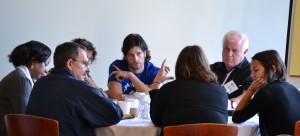Here’s an interesting article about the changing world of organizational management and leadership:
HR Magazine – New model leaders: How leadership is changing – by Katie Jacobs
What are the implications for our students? The future of work is fluid, collaborative, fast, and dependent on good communications skills. And I don’t mean to suggest that school is all about preparing students for work. Whatever they might pursue in their personal lives, their artistic lives, their political lives – the change is applicable all around. But we already knew that, right?
 I think what might not be so obvious is that we need to bring more of this distributed leadership to school systems. First of all, it’s more challenging to prepare students for a way of interacting and collaborating that we don’t genuinely experience ourselves. But there are other reasons to move in that direction.
I think what might not be so obvious is that we need to bring more of this distributed leadership to school systems. First of all, it’s more challenging to prepare students for a way of interacting and collaborating that we don’t genuinely experience ourselves. But there are other reasons to move in that direction.
Some key quotes:
- Simon Lloyd, HR director of Santander says, “technology is freeing things up” and cites growing complexity as one reason for leadership evolution. “Organisations have become very big and trying to impose a command and control structure doesn’t work,” he says.
- Bernd Vogel, associate professor of leadership and organisational behaviour at Henley Business School and director of the Henley Centre for Engaging Leadership, adds that while it’s too simplistic to chalk everything up to age, expectations are shifting. “[Generation Y] is much more willing to express their need for co-creation. Twenty years ago, people had the same motivation, but thought they needed to learn their trade before they were allowed to speak up. That’s not happening any more.”According to Oswick, this shift will fundamentally impact how organisations are structured. “Society has changed,” he says. “People want to be engaged, not led. They want autonomy, more of a stake and to feel part of a community.”
“People today join communities rather than companies,” agrees Sutter. “Leaders have to have a sense of what the community values and bring it all together.”
- Michael West, professor at Lancaster University Management School’s Centre for Performance-Led HR, has been working with healthcare charity The King’s Fund on how collective leadership could fix cultural problems in the NHS. “The traditional approach we’ve had to leadership is individually focused,” he says. “We haven’t thought of leadership as a collective and social process. How do we create a structure where everyone has the potential to be a leader, no matter where they sit in the hierarchy, and where leadership is an outcome of expertise?”
Of course, in order to be entrusted with additional autonomy and responsibility, teachers will need to hold each other accountable. It’s a trade-off we need to discuss. In Professional Capital, Hargreaves and Fullan discuss at length the transition from individual autonomy to professional autonomy. If we want to be in charge of our profession, we have to be prepared for some hard conversations about setting and living up to our own professional and pedagogical standards.
